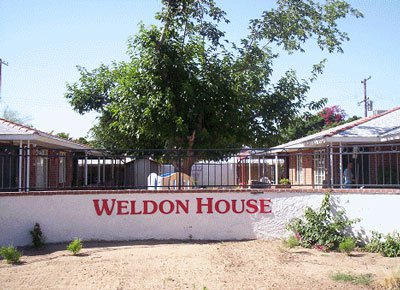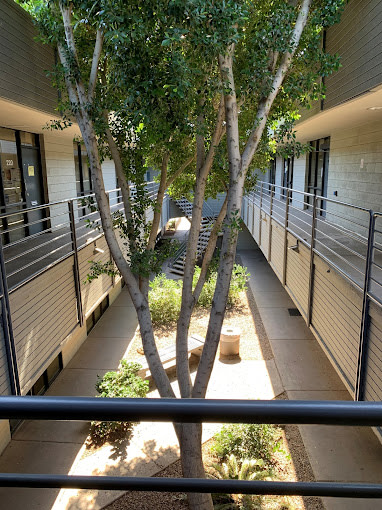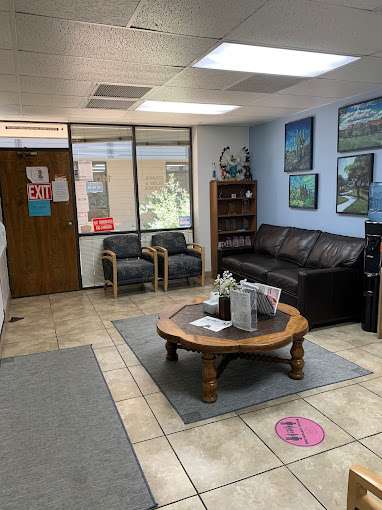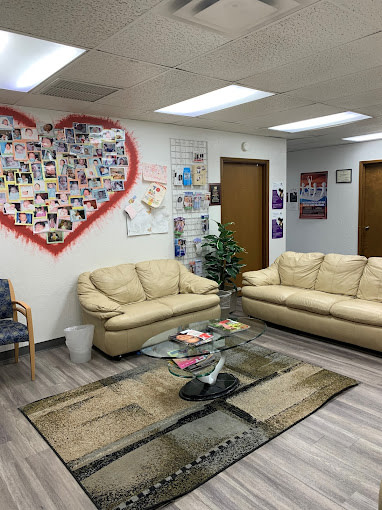






Arizona Women's Recovery Center
Treatment Focus
This center treats substance use disorders and co-occurring mental health conditions. Your treatment plan addresses each condition at once with personalized, compassionate care for comprehensive healing.
Primary Level of Care
Outpatient treatment offers flexible therapeutic and medical care without the need to stay overnight in a hospital or inpatient facility. Some centers offer intensive outpatient program (IOP), which falls between inpatient care and traditional outpatient service.
This provider hasn't verified their profile's information. Are you the owner of this center? Claim your listing to better manage your presence on Recovery.com.
Treatment Focus
This center treats substance use disorders and co-occurring mental health conditions. Your treatment plan addresses each condition at once with personalized, compassionate care for comprehensive healing.
Primary Level of Care
Outpatient treatment offers flexible therapeutic and medical care without the need to stay overnight in a hospital or inpatient facility. Some centers offer intensive outpatient program (IOP), which falls between inpatient care and traditional outpatient service.
Provider's Policy
Arizona Women’s Recovery Center accepts all AHCCCS plans as a form of payment for treatment. We also will accept clients on a sliding fee scale. If you do not have AHCCCS, most members are eligible for the Substance Use Block Grant (SUBG). Funding is available to provide substance use treatment services to uninsured or underinsured adults and youth with a substance use disorder
Arizona Women's Recovery Center
Arizona Women's Recovery Center
About Arizona Women's Recovery Center
Arizona Women’s Recovery Centers (AWRC) provides comprehensive, women-centered and evidence-based treatment, designed to empower women, pregnant women and women with children who are struggling with addiction and co-occurring mental health disorders. They offer a holistic healing experience with outpatient care tailored for women and their children as they remain unified, residing in structured sober housing.
A Safe Place to Build a Strong Foundation
AWRC offers several different services for women, with safe and sober therapeutic communities and peer-based programs. They provide supportive housing with treatment tailored for women with children, pregnant women, women involved in the legal system, and single women who are not currently parenting.
Women reside in apartment-style living, with each woman or family in their own fully-furnished unit, with access to supportive staff who are on-site 24 hours a day. Staff consist of certified counselors, career counselors, a nurse practitioner, a GED tutor, peer support specialists, and case managers. During treatment, women can receive individual and group therapy, family counseling, job training, educational services, transportation assistance, clothing, and psychiatric and medical services.
Build Skills for a Brighter Future
AWRC also offers comprehensive career and vocational training, and an on-site thrift store, Sustain, for job training. Women can work at Sustain to get work experience and help build their resume. AWRC supports women with long-term barriers to employment, such as mental illness, trauma, and domestic violence. Their goal is to help them find and maintain employment and advance their careers, fostering economic independence and stable lifestyles.
Structured and Supportive Trauma-Informed Care
In addition to a structured and supportive living environment, clients at AWRC participate in trauma-informed care in an outpatient setting. Treatment happens in 3 phases: clients on level 1 meet for 3 group meetings per week, with a strong emphasis on addiction education, grief, parenting, 12-Step recovery and relapse prevention. Phase 2 involves 2 group meetings per week, focused on maintaining boundaries and healthy relationships, behavior modification, positive coping skills and creating recovery-based beliefs and values. Phase 3 meets only 1 day per week, offering continued support and strengthening of life and recovery skills. Throughout the program, women can access 1-on-1, group, and family therapy, parenting coaching, dual-diagnosis and psychiatric care, career counseling, and more.

Center Overview
Treatment Focus
This center treats substance use disorders and co-occurring mental health conditions. Your treatment plan addresses each condition at once with personalized, compassionate care for comprehensive healing.

Insurance Accepted
Cash Pay Rates
Estimated Cash Pay Rate
Center pricing can vary based on program and length of stay. Contact the center for more information. Recovery.com strives for price transparency so you can make an informed decision.
Levels of Care








Your Care Options
Specializations
Co-Occurring Disorders
A person with multiple mental health diagnoses, such as addiction and depression, has co-occurring disorders also called dual diagnosis.
Drug Addiction
Drug addiction is the excessive and repetitive use of substances, despite harmful consequences to a person's life, health, and relationships.
Gender-Specific
Separate treatment for men or women can create strong peer connections and remove barriers related to trauma, shame, and gender-specific nuances.
Alcohol
Using alcohol as a coping mechanism, or drinking excessively throughout the week, signals an alcohol use disorder.
Who We Treat
Women only
Women attend treatment in a gender-specific facility, with treatment delivered in a safe, nourishing, and supportive environment for greater comfort.
Pregnant Women
Addiction and mental health treatment meets the clinical and psychological needs of pregnant women, ensuring they receive optimal care in all areas.
Approaches
Twelve Step
Incorporating spirituality, community, and responsibility, 12-Step philosophies prioritize the guidance of a Higher Power and a continuation of 12-Step practices.
Gender-Specific
Separate treatment for men or women can create strong peer connections and remove barriers related to trauma, shame, and gender-specific nuances.
Evidence-Based
A combination of scientifically rooted therapies and treatments make up evidence-based care, defined by their measured and proven results.
Therapies
1-on-1 Counseling
Patient and therapist meet 1-on-1 to work through difficult emotions and behavioral challenges in a personal, private setting.
Family Therapy
Family therapy addresses group dynamics within a family system, with a focus on improving communication and interrupting unhealthy relationship patterns.
Twelve Step Facilitation
12-Step groups offer a framework for addiction recovery. Members commit to a higher power, recognize their issues, and support each other in the healing process.
Art Therapy
Visual art invites patients to examine the emotions within their work, focusing on the process of creativity and its gentle therapeutic power.
Trauma-Specific Therapy
This form of talk therapy addresses any childhood trauma at the root of a patient's current diagnosis.
Life Skills
Teaching life skills like cooking, cleaning, clear communication, and even basic math provides a strong foundation for continued recovery.
Conditions We Treat
Trauma
Some traumatic events are so disturbing that they cause long-term mental health problems. Those ongoing issues can also be referred to as "trauma."
Substances We Treat
Cocaine
Cocaine is a stimulant with euphoric effects. Agitation, muscle ticks, psychosis, and heart issues are common symptoms of cocaine abuse.
Prescription Drugs
It's possible to abuse any drug, even prescribed ones. If you crave a medication, or regularly take it more than directed, you may have an addiction.
Benzodiazepines
Benzodiazepines are prescribed to treat anxiety and sleep issues. They are highly habit forming, and their abuse can cause mood changes and poor judgement.
Ecstasy
Ecstasy is a stimulant that causes intense euphoria and heightened awareness. Abuse of this drug can trigger depression, insomnia, and memory problems.
Co-Occurring Disorders
A person with multiple mental health diagnoses, such as addiction and depression, has co-occurring disorders also called dual diagnosis.
Psychedelics
Hallucinogenic drugs—like LSD—cause euphoria and increased sensory experiences. When abused, they can lead to depression and psychosis.
Drug Addiction
Drug addiction is the excessive and repetitive use of substances, despite harmful consequences to a person's life, health, and relationships.
Heroin
Heroin is a highly addictive and illegal opioid. It can cause insomnia, collapsed veins, heart issues, and additional mental health issues.
Synthetic Drugs
Synthetic drugs are made in a lab, unlike plant-based drugs like mushrooms. Most synthetic drugs are either stimulants or synthetic cannabinoids.
Languages
Aftercare
Care Designed for Your Needs
Personal Amenities
Amenities
Special Considerations
Gender-specific groups
Patients in gender-specific groups gain the opportunity to discuss challenges unique to their gender in a comfortable, safe setting conducive to healing.
Family Member Stays
Treatment providers welcome family members to stay on-site to better the experience and success of patients and their families as a whole.
Activities
Smoking and Vaping Policy






